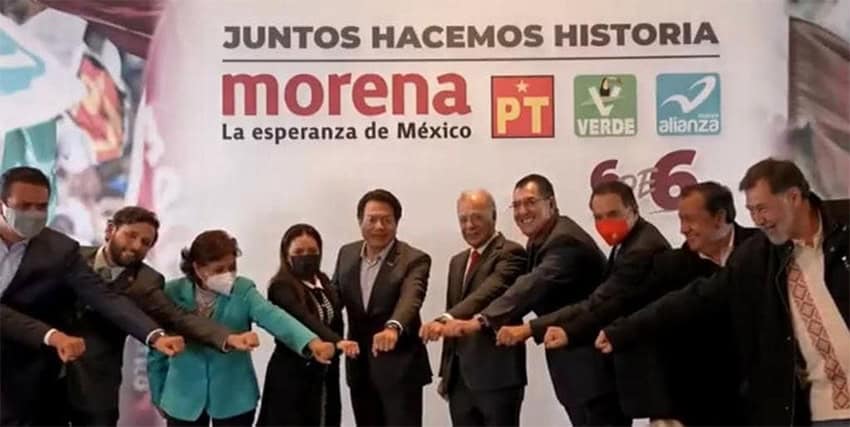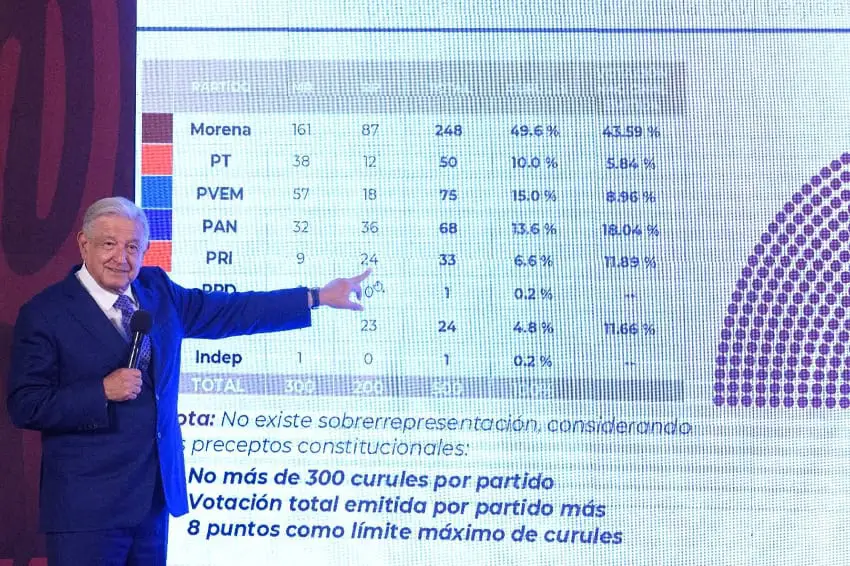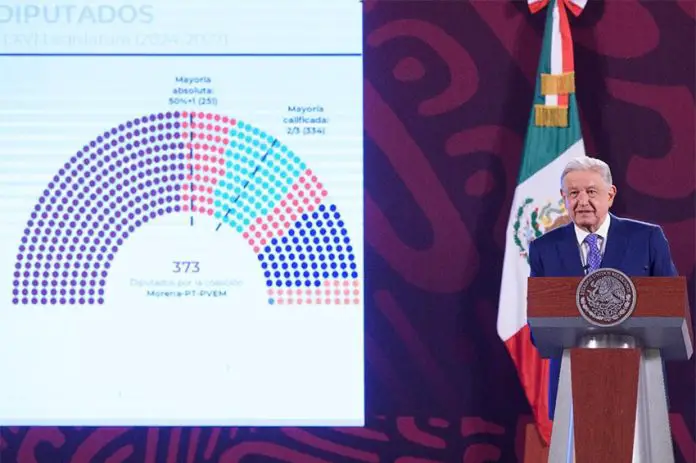The National Electoral Institute (INE) has calculated the allocation of proportional representations seats in Congress, delivering favorable results — including a supermajority — for the ruling Morena party and its coalition allies.
According to the as-yet-unratified INE calculations, the Morena-led coalition will have a supermajority in the Chamber of Deputies, allowing it to approve constitutional reform proposals without opposition support. It will also have a strong majority in the Senate.
The INE determined that Morena and its allies, the Labor Party (PT) and the Ecological Green Party of Mexico (PVEM), won 364 of the 500 seats in the lower house, or 73% of the total.
Three hundred of those seats are allocated directly to candidates who won elections in the same number of districts, while 200 go to plurinominal, or proportional representation, candidates based on the percentage of votes won by each party.
Morena, the PT and the PVEM won 256 of the 300 districts, or 85% of the total.
The INE determined that Morena and its allies won 83 of the 128 Senate seats, including 32 allocated via proportional representation. That’s three seats short of a two-thirds majority, meaning that the Morena-led coalition will need the votes of a few opposition senators to pass constitutional reform proposals such as the controversial judicial reform bill.

The INE’s General Council will hold a ratification vote on the results this Friday. A split vote is expected as there is contention over whether seats in Congress were allocated in accordance with the Constitution.
The recently elected lawmakers will assume their positions on Sept. 1, one month before Claudia Sheinbaum takes the oath of office as Mexico’s first female president.
The makeup of the Chamber of Deputies
Based on the INE calculations, the 500 seats in the lower house of Congress will be allocated as follows:
- Morena: 236 seats
- PVEM: 77 seats
- PT: 51 seats
The three allied parties will thus have 364 seats in the Chamber of Deputies, 30 more than the number required to reach a supermajority.
- National Action Party (PAN): 72 seats
- Institutional Revolutionary Party (PRI): 35 seats
- Democratic Revolution Party (PRD): 1 seat
Those three parties, which together formed the Strength and Heart for Mexico coalition, will have 108 seats in the lower house of Congress.
- Citizens Movement (MC): 27 seats
- Independent candidates: 1 seat
The composition of the Senate
Based on the INE calculations, the 128 seats in the Senate will be allocated as follows:
- Morena: 60 seats
- PVEM: 14 seats
- PT: 9 seats
The three allied parties will thus have 83 of the 128 Senate seats.
- PAN: 22 seats
- PRI: 16 seats
- MC: 5 seats
- PRD: 2 seats
Controversy over the Morena-led coalition’s supermajority
INE reportedly received a total of 69 complaints from civil society organizations, former electoral councilors and judges, academics and regular citizens about the alleged “overrepresentation” of Morena and its allies in Congress.
They have questioned how the Morena-led coalition can have a supermajority in the lower house of Congress when the three parties only won 55% of the vote in the Chamber of Deputies election.
The 73% of seats allocated to the three parties is 18 points higher than the collective vote they received. That is 10 points higher than the eight-point discrepancy allowed by the constitution.
However, the INE document outlining the allocation of Congress seats says that the eight-point rule applies to individual political parties, rather than a coalition of parties.

In other words, its view is that each of Morena, the PT and the PVEM may hold a percentage of seats eight points above the percentage of votes they received. The INE has made the same determination in the past, including after the 2012, 2015 and 2018 elections.
However, some electoral councilors reportedly don’t agree with the interpretation.
Citing unnamed sources, the Reforma newspaper reported that a group of electoral councilors will present an alternative proposal this Friday in “a final attempt” to stop Morena and its allies from getting a supermajority in the Chamber of Deputies.
The INE’s allocation of seats could also face challenges in the Federal Electoral Tribunal (TEPJF).
What does the Constitution say?
According to an English-language version of the Mexican Constitution posted to the TEPJF website, “The political parties shall never have a number of representatives whose percentage of the House exceeds by eight points the percentage they have obtained in the vote.”

“This restriction shall not be applied to the political party that, due to its electoral victories at uninominal districts, obtains a percentage of seats greater than the addition of the percentage obtained in national vote plus eight percent.”
President Andrés Manuel López Obrador has asserted that the eight-point rule applies to individual parties rather than a coalition, and called on the INE and the TEPJF to respect the Constitution.
‘The word party refers to political force’
Among those who believe that a coalition should not be allowed to hold a percentage of seats in Congress that exceeds the percentage of votes it won by more than eight points is political scientist José Antonio Crespo.
In a column in the El Universal newspaper, he wrote that the use of the word “party” in the Constitution applies both to an individual party and a coalition.
“In the exposición de motivos [constitutional document] it is clear that the word ‘party’ refers to ‘political force,’ whether it is a single party or a coalition,” Crespo said.
On the social media platform X, political scientist José Antonio Crespo shared a graphic showing that the last Mexican president to have a supermajority in the Chamber of Deputies was Miguel de la Madrid in 1982.En esta gráfica se puede apreciar a simple vista como fue el paso del autoritarismo a la democracia, y el regreso de la democracia al autoritarismo.
La última vez que un presidente tuvo mayoría calificada fue De la Madrid, en 1982. Un retroceso de cuatro décadas. pic.twitter.com/ogU0ZdYUq5— José Antonio Crespo (@JACrespo1) August 21, 2024
Consequently, a coalition cannot be “overrepresented” by more than eight points, he added.
The dispute over whether the Morena-led coalition should be allowed to hold 73% of the seats in the lower house of Congress comes as López Obrador attempts to win approval for a range of constitutional reform proposals before he leaves office.
Among the proposals he sent to Congress in February are controversial bills that aim to allow citizens to directly elect Supreme Court justices; disband a number of autonomous government agencies; and incorporate the National Guard into the military.
The judicial reform proposal is generating major concern among investors, and has contributed to a significant depreciation of the Mexican peso since the June 2 elections.
With reports from Reforma, La Jornada and El País
